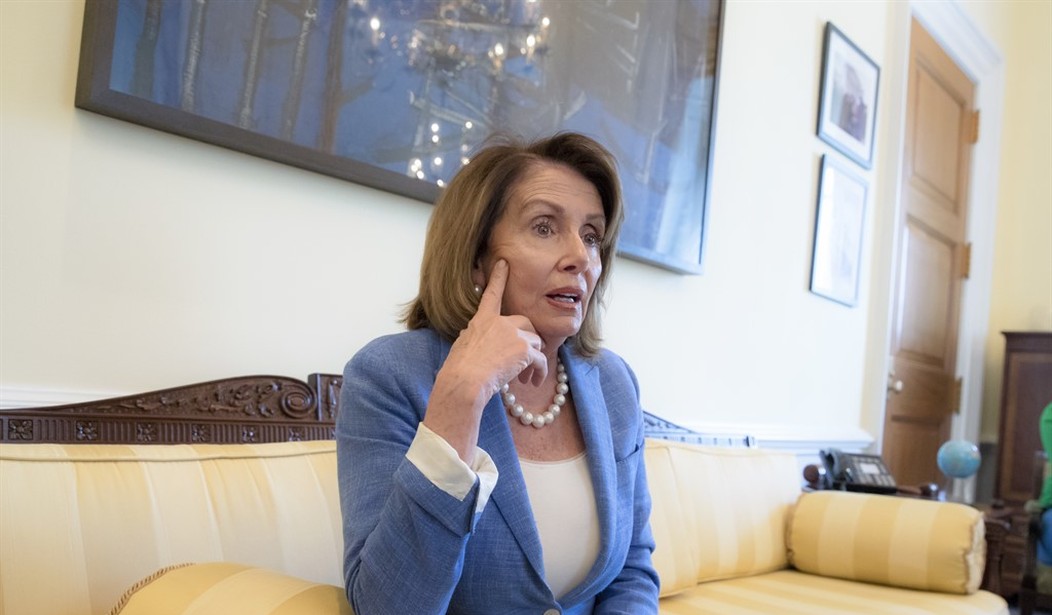One of the Left's favorite anti-tax reform tactics involved loudly griping about how the law's corporate tax cuts were permanent (there's a good economic argument for that, of course), whereas the tax cuts for individuals and families are set to expire -- which is where the misleading "tax increase" talking point comes from. Those taxes would only increase if Congress allows them to, and based on recent history and the tough political dynamics, the likelihood of reversing all or most of the recently-enacted tax reductions is slim to none. Nevertheless, Democrats carried on as if Republicans were deliberately targeting taxpayers with a hike down the road, demanding that the tax cuts be made permanent. They knew full well that the GOP was playing a budgetary game in order to shoehorn their bill through under "reconciliation," which allows for passage with a simple majority in the US Senate. The on-paper sunsetting of the new rates was necessary to make the math work, pure and simple. In an effort to exploit this technicality, Democrats called up a vote to extend the middle class tax cuts indefinitely, which Republicans defeated for procedural reasons. The ploy succeeded, handing Democrats a campaign-ready claim about (eventual and unlikely) GOP tax increases. Soon after passage, National Review's Rich Lowry urged GOP leaders to call their opponents' bluff:
First thing Republicans should do when they are back is make Democrats vote on extending all the middle-class tax cuts https://t.co/YVSd9q8XLy
— Rich Lowry (@RichLowry) December 24, 2017
A leading Democratic criticism of the tax bill is that the middle-class tax cuts expire. This should be very easy to remedy — Republicans should make the Democrats vote on extending them as soon as Congress comes back next year. If Democrats don’t go back on what they’ve been saying about how terrible it is that these tax cuts are temporary, passage of an extension should be a big, bipartisan accomplishment in the new year that everyone can feel good about.
Well, it may not have been the very first thing on the Republicans' agenda this year, but it looks like Paul Ryan and Mitch McConnell are gearing up to heed this advice. First, from the House side:
The House will vote this year to make individual tax cuts permanent, Speaker Paul Ryan said Tuesday. Ryan, R-Wis., didn’t provide a date, but said “we fully intend,” to pass legislation that would make permanent the reduction in individual tax rates included in the new comprehensive tax reform law. “That is something we will be acting on later this year,” Ryan said...Republicans will use the tax vote later this year pressure Democrats closer to the midterm elections, according to Americans for Tax Reform President Grover Norquist.
Why, that almost sounds like crafty strategic thinking. Meanwhile, over in the Senate:
Senate Majority Leader Mitch McConnell is weighing whether to force a vote on making the GOP's temporary tax cuts for individuals permanent. The Kentucky Republican told reporters Tuesday the chamber "may" hold a vote this year on extending the tax cuts. While the 2017 law provided permanent tax cuts on corporations, tax cuts for regular people expire in 2027 due to Senate rule constraints..."If they are interested in making the individual rates permanent that’s something we ought to take a look at. I don’t know why we wouldn’t want to do that," McConnell said...Even if Democrats won't support the proposal, such a vote may have political utility after Senate Democrats opposed last year's tax measure. Ten Democrats are up for reelection this year in states that President Donald Trump won, and voting against tax cuts a second time could be fodder for Republicans looking to pick up Senate seats.
Recommended
They wouldn't merely be voting against tax cuts for a second time (every last Democrat in Congress voted 'no' on the succeeding tax reform law), they'd be voting explicitly against the very middle class tax cuts they'd previously complained didn't go far enough. And if they flip-flop to 'yes,' they'd risk angering their resistance-minded base while again affirming the Republican point that their law did, in fact, slash taxes for middle income families. Quite the self-inflicted dilemma. I'll leave you with McConnell wryly attacking Democrats for attending a left-wing rally to repeal tax reform earlier this week. That's what hardcore partisan tribalism requires of them, of course, but they were protesting a law that is undeniably working and boosting the US economy and employment picture. Their previous demagoguery has been exposed by reality, yet they keep digging:
“I noticed that a number of my Democratic colleagues attended a small protest rally yesterday. It was right here, on the Capitol grounds. Apparently it was put on by a number of left-wing pressure groups, including MoveOn.org, Planned Parenthood, and Big Labor. So what were they protesting? What outrage brought leading Democrats to join this protest on the East Front of the Capitol? Turns out, it was the fact that Republicans let middle-class families and American small business keep more of their own money. That’s right. Democrats are rallying to repeal your tax cuts. Never mind that our pro-growth tax reform has led to thousand-dollar bonuses, pay raises, educational opportunities or other new benefits for millions of Americans. Democrats still want to repeal it. Never mind the new estimate that says tax reform will yield more than a million new jobs in the next decade. Or the fact that jobless claims are at their lowest level since 1973. No amount of good news will shake Democrats’ confidence that they know how to spend the American people’s money better than the American people."
McConnell's taciturn demeanor and dull delivery takes some of the bite out of this counterpunch, but it's really strong messaging that other Republicans should echo.

























Join the conversation as a VIP Member